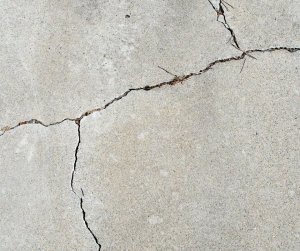After you have your concrete raised, you will need to have periodic maintenance on the cracks in your concrete. Caulking is the best solution out there for maintenance of cracks. Typically, we suggest caulking should be checked 2-3 times a year. However, there is no set rule for how many times it should be caulked.
The lifespan of caulking depends on the weather conditions. Elements such as heat and cold will expand and contract the caulking, which diminishes the lifespan of your caulking. Winters are typically the harshest on caulking so paying attention to your cracks after a harsh winter followed by a warm spring should be one of your priorities.
What are the benefits of caulking?
- prevent erosion underneath concrete slabs
- prevent cracking, expansion and contraction
- eliminate basement leaks and bowed walls
- eliminate grass and weeds from growing in seams in the concrete
- overall aesthetic appeal — a cracked sidewalk or driveway just doesn’t look attractive
Typically, the following areas will need to caulked: windows, driveways, patios, garage floors, pool decks and walls, walkways and porches.

Hire a Professi0nal with Experience
Even worse, a combination of failed caulking with a company that doesn’t properly lift the concrete will result in a waste of money. There are a few concrete lifting companies out there who are recommending “preventive lifting” for your driveway. For our experts here at Concrete Raising Systems, it doesn’t make any sense to do ‘preventative lifting’ on a driveway. Furthermore, if a foam lifting company is using jacks or sandbags to try and even the concrete slab, they don’t have enough experience to repair your concrete. This is a sign that the company is still trying to figure out how to raise a concrete slab. And FYI, don’t let them practice on your driveway.
If you need your concrete lifted, call Concrete Raising Systems of Kansas City. We will evaluate your driveway, patios, garage floors, etc. to see if we can repair your concrete before you pay a lot more money to have it replaced. Don’t wait till the problem gets worse. Waiting can be more expensive. Call us at (816) 419-8306.
This article was originally published in September, 2015 and has been recently updated.

Thank you for sharing that caulking can help prevent cracking, expansion, and contraction of your concrete which will only cause further damage. My uncle just mentioned the other day that he has noticed some cracks appearing in the wall of his house. I will suggest to him hiring a reliable service that can perform caulking so the issue can be solved.
Something we’ve noticed on certain jobs is how much the environment around the concrete surface can affect the lifespan of the driveway and any caulking that has already taken place. One that always surprises our clients is how trees growing close to a driveway may lead to damage over the long term, due to their root network expanding and potentially causing instability.